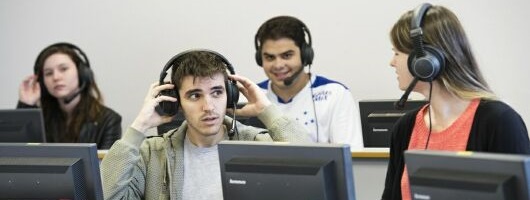
By Mary Raftery
Many students feel that in-person interaction is crucial to their learning of a language at Third Level. Language students have been hopeful for the return of language labs on campus for semester two.
Unfortunately, this looks unlikely as the use of headsets and microphones are essential in labs and it would prove quite difficult to disinfect them after every student.
First-Year students are bearing the brunt of the absence of in class teaching. Some argue they do not know any different, but it is fair to say they are in an unfavourable position relative to previous years. They have not yet met their classmates or lecturers in person and have not been able to participate in face-to-face group activities, a vital component of language learning.
However, under the circumstances which have become our new normal such as facemasks and social distancing, group work may be more effective online. SIN spoke to Dr Tina-Karen Pusse, Head of the School for Languages in NUI Galway, who agreed that in the interim, online languages classes will be the only recourse.
“I would say that learning languages entirely with online tuition is a challenge, but it is the better option compared with students having to remain at one spot in a classroom not being able to engage in group activities, which are central for learning, and at the moment easier to organise in Blackboard breakout groups than on site at sufficient distance.”
Dr Pusse also acknowledged that students can benefit from being in the comfort of their own home and from recorded lectures;
“What works particularly well is that there is a subset of students who might have been intimidated to talk in front of a classroom, but feel more encouraged to get involved from the familiar surroundings of their bedrooms”
“Students who have struggled with attendance issues in the past, or who were sick for an extended period now have the opportunity to access recorded sessions that they have missed.”
One lecturer said that she believed that online learning has proven to be “effective”, but said that creating a sense of community within the class requires “a lot of work.”
“I actually think that online language learning can be quite interactive and effective. I use a mix of asynchronous and synchronous classes.”
“It’s a lot more work to make the learning experience effective and varied and to create a sense of class community but it’s possible to achieve this. My students (in Second-Year) seem to be happy enough with the experience according to various polls and surveys over the past weeks.”
SIN spoke to a Final Year French student who feels she is not reaping any benefits of online language learning,
“It’s weird because it is meant to be really interactive, but we just end up reading notes, so it is not working. I feel I have lost my French. I honestly don’t think I’ve ever spoken this little French.”
Another language student sad that she feels that online language teaching fails to promote conversation,
“It’s hard to properly grasp what she’s asking us to do with tasks and stuff, so it is hard to keep concentration. We don’t talk as much or practice speaking as we would in class’”
A difficulty for the lecturers in this regard is that students can be unwilling to switch on their cameras and microphones. Dr Pusse spoke about these challenges,
“The biggest challenge is that students are reluctant to switch their cameras on, and therefore for us as lecturers it is hard to judge whether something we explain is understood or not. Also, even if cameras are switched on, it makes a difference that there is no direct eye contact, and therefore no nonverbal understanding cues,”
The Language Department envisage a blend of on–campus and online language learning post-Covid. Dr Pusse described how this would work,
“For the future, we are therefore thinking about combining the advantages of online tuition with classroom settings, for example by not offering all classes on site in years to come.”
“For lecture formats with little interaction, an asynchronous online option might be an advantage as it produces fewer timetable clashes and students can watch grammar introductions or consult discussion boards as often, or as slowly as they need to. If we can then combine these with life conversation classes, role play and performative modules such as our drama groups, this would be the best of both worlds.” she added.